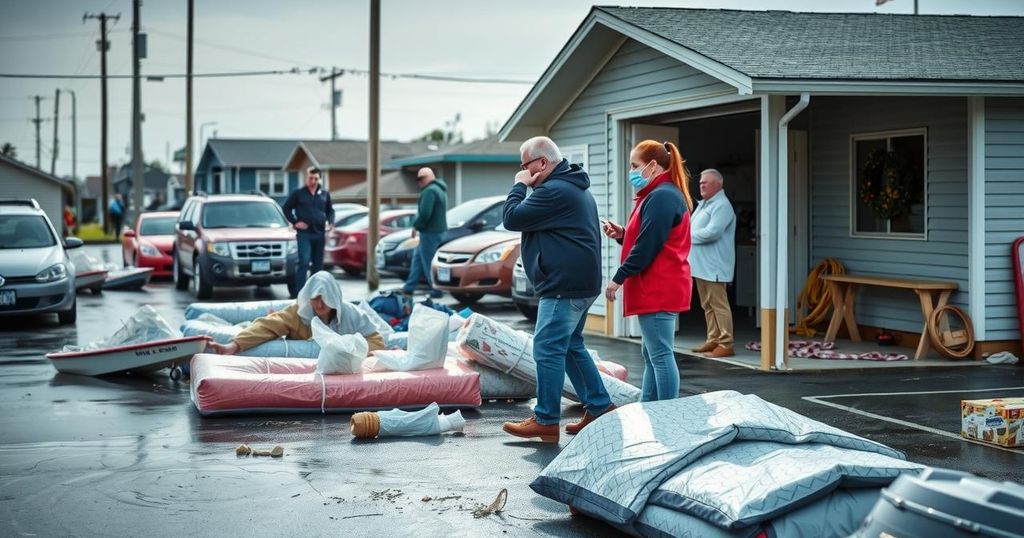World news
AFRICA, COUNTY, DEMOCRAT, DISASTER RELIEF, EMERGENCY MANAGEMENT, EMERGENCY RESPONSE, EVACUATIONS, GLENN YOUNGKIN, INDIVIDUAL ASSISTANCE, MERCER COUNTY, NATURAL DISASTER, NATURAL DISASTERS, SOUTH AFRICA, TAZEW, TAZEWELL COUNTY, VIRGINIA, VIRGINIA DEPARTMENT OF HOUSING AND COMMUNITY DEVELOPMENT, VIRGINIA GENERAL ASSEMBLY, YOUNGKIN
Aisha Khan
0 Comments
Governor Youngkin Proposes $127 Million Fund for Hurricane Recovery in Virginia
Virginia Governor Glenn Youngkin has proposed a $127 million investment to establish a Disaster Assistance Fund to support recovery efforts for residents affected by Hurricane Helene. This fund aims to fill gaps left by federal and private assistance for housing and safety needs. The proposal must gain approval from the Democrat-controlled Virginia General Assembly to proceed.
State officials in Virginia are actively seeking additional assistance for residents affected by the remnants of Hurricane Helene. Governor Glenn Youngkin proposed a $127 million investment to create a Disaster Assistance Fund within the Virginia Department of Housing and Community Development. This one-time funding aims to aid recovery efforts by bridging gaps left by federal and private initiatives. With the recent closure of a FEMA recovery center in Tazewell County, which was severely impacted, the Governor emphasized the necessity of this funding to support essential recovery needs.
Under the proposed plan, the Disaster Assistance Fund would address life, safety, and housing-related expenses that do not receive coverage from federal aid, private contributions, or insurance policies. The proposal requires legislative approval from the Democrat-controlled Virginia General Assembly to become operational in the forthcoming sessions. Governor Youngkin remarked, “Our fellow Virginians have suffered an unimaginable impact from Hurricane Helene.” He stated that the creation of the Disaster Assistance Fund is vital in ensuring that the Commonwealth can respond effectively to unfulfilled community needs following natural disasters.
The Governor’s office stated that the funding would include $25 million from the General Fund and $102 million derived from the Regional Greenhouse Gas Initiative’s 2023 final payment. The impact of Hurricane Helene was extensive, affecting 36 localities across Southwest Virginia. Noteworthy consequences included power outages to over 310,000 residents, the closure of 484 roads and 118 bridges, and significant agricultural losses amounting to $630 million.
In neighboring West Virginia, recovery support has also been mobilized with the establishment of both a FEMA Recovery Center and a Small Business Administration (SBA) Recovery Center in Mercer County. The SBA center, located at the Princeton Public Library, continues to assist businesses in recovery efforts. Individuals in West Virginia may also access the FEMA Disaster Recovery Center in Bluefield, dedicated to offering support following the devastating storm.
As Virginia continues to recover from this disaster, the engagement of local, state, and federal partners remains critical to restoring the affected regions and ensuring the well-being of its citizens.
In the wake of Hurricane Helene’s destructive remnants, which impacted several areas of Virginia, state officials have recognized the necessity for additional support for residents in recovery efforts. The proposed Disaster Assistance Fund aims to complement existing federal assistance by covering costs not addressed by current aid systems. Governor Glenn Youngkin’s initiative reflects the ongoing challenges faced by communities recovering from the severe aftermath of the hurricane and highlights the collaborative efforts required for effective disaster response and management.
In summary, Virginia is taking proactive steps to aid recovery efforts for residents affected by Hurricane Helene by proposing a significant investment through the Disaster Assistance Fund. This funding initiative aims to address recovery gaps created by federal and private assistance limitations. With legislative approval pending, this initiative highlights the state’s commitment to supporting local communities in their recovery journey following this natural disaster.
Original Source: www.bdtonline.com




Post Comment